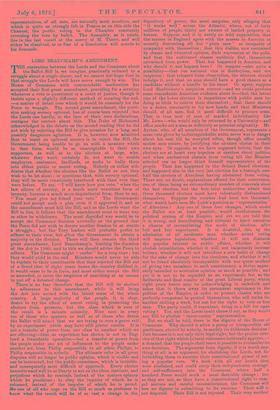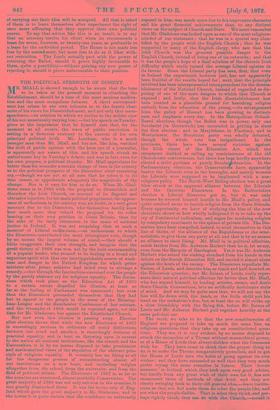LORD BEAUCHAMP'S AMENDMENT.
THE contention between the Lords and the Commons about the Ballot Bill is, we imagine, practically reduced to a struggle about a single clause, and we cannot but hope that in that struggle the Lords will have nerve enough to win. The House of Commons with commendable moderation has accepted their first great amendment, providing for a scrutiny whenever a vote is questioned in a court of justice, though it insists upon a slightly different method of securing the end, —a matter of detail over which it would be unseemly for the Peers to wrangle. The second great amendment, the provi- sion making secrecy optional, has of coarse been rejected ; but the Lords can hardly, in the face of their own declarations, continue the contest about this. The Duke of Richmond acknowledged in the debate on the second reading that he did not wish by rejecting the Bill to give occasion for a long and possibly dangerous agitation. It is, however, now admitted that to insist on optional secrecy is to reject the Bill, the Government being unable to go on with a measure which in that form would be so unacceptable to their own supporters, as well as to the electors at large, who, whatever they want, certainly do not want to enable employers, customers, landlords, or mobs to bully them into either public or secret voting. Nobody on either side denies that whether the electors like the Ballot or not, they wish to be let alone ; or questions that, with secrecy optional, they will be more vexatiously interfered with than ever they were before. To say, " I will know how you vote," when the law allows of secrecy, is a much more vexatious form of tyranny, because a much more inquisitorial form, than to say, " You must give my friend your vote." The Government could not accept such a plan even if it approved it, and as the amendment must kill the Bill, and as the Lords want the Bill to live, it follows that the amendment must in some way or other be withdrawn. The most dignified way would be to accept the Commons' decision avowedly on the ground that the Peers did not wish to devote another Session to so sterile a struggle ; but the Tory leaders will probably prefer to adhere to their view, but allow the Government to obtain a majority in the division. There will then remain the third great amendment, Lord Beauchamp's, limiting the duration of the Act to 1880, and to this we should advise the Peers to adhere. The Commons might " confer " for a long time ; but they would yield in the end. Members would never be able to explain to their constituents that they rejected the Bill out of a dread that if eight years hence the country disliked it, it would cease to be in force, and must either accept the Bill as amended, or incur the suspicion of snatching at an excuse to put off a detested change.
There is no fear therefore that the Bill will be shelved by adherence to this amendment, while it will bring the Act into accord with the latent sense of the whole country. A large majority of the people, it is clear, desire to try the effect of secret voting in protecting the electors from pressure, but the class which is sure of the result is a minute minority. Nine men in every ten of those who approve as well as of those who detest the Ballot will admit that we are trying to cure a grave evil by an experiment which may have still graver results. It is not a transfer of power from one class to another which we are effecting—that, as experience has shown, is not in Eng- land a formidable operation—but a transfer of power from the people under one set of influences to the people under another set, from Philip responsible to all other Philips, to Philip responsible to nobody. The ultimate ruler in all great disputes will no longer be public opinion, which is visible and can be instructed, bat the public conscience, which is invisible, and consequently most difficult of approach. Every elector henceforward will be at liberty to act on the ideas, instincts, and prejudices which he conceals, instead of the mature opinion which he proclaims ; to obey the impulse of which he is ashamed, instead of the impulse of which he is proud. No one of all who urge on the Bill so much as professes to know what the result will be of so vast a change in the depositary of power, the most sanguine only alleging that " it works well" across the Atlantic, where, out of forty millions of people, thirty are owners of landed property or houses. Suppose, and it is surely no wild supposition, that the masses in England agree with the masses in America in secretly distrusting all but " plain men " as incapable of sympathy with themselves ; that this dislike, now restrained by shame and educated opinion, finds expression at the polls, and that the cultivated classes suddenly find themselves ostracised from power. That has happened in America, and why should it not happen here ? Or suppose—also quite a possibility—that our national vice is flankeyism, and not suspicion ; that released from observation, the electors should indulge it, and that no man should have a good chance as a candidate without a handle to his name. Or again, suppose Lord Shaftesbury's suspicion correct—and we could produce some remarkable American evidence about it—that the latent vice Of the lower electors is impatience with public men for /Icing so little to relieve their discomfort ; that there should be a desire constantly to try new hands, and that Ministers should, of all men, find it most difficult to procure seats. That is true now of men of marked individuality like Mr. Lowe—who would only be returned by a University—and office marks out a man as definitely as personal originality. Mr. Ayrton, who, of all members of the Government, represents a mass vote given by indistinguishable units, never was in danger about his seat till he accepted office, though office usually makes men secure, by justifying the electors' choice in their own eyes. Or suppose, as we have supposed before, that the electors are at heart very hopeless or careless about politics, and when unobserved abstain from voting till the Member selected can no longer think himself representative of the people. That has happened in the School Board elections, and happened also in the very last election for a borough, one- half the electors of Aberdeen having abstained from voting. There are, no doubt, explanations offered for that occurrence, one of them being an extraordinary number of removals since the last election, but the best. local authorities admit that three thousand electors must have voluntarily disfranchised themselves. Suppose the number had been ten thousand, what would have been Mr. Leith's position as " representative " of Aberdeen Any one of these four changes, which under the Ballot are at least possible, would revolutionise the political system of the Empire, and yet we are told that it is wrong, and humiliating, and illiberal to leave ourselves a chance of reconsidering the mode of election, after full and fair experiment. It is doubtful, too, by the admission of all moderate men, whether secret voting will improve legislation, whether it will not diminish the popular interest in public affairs, whether it will abolish intimidation, whether it will not immensely increase bribery, whether it will not introduce a new habit of change for the sake of change into the elections, and whether it will not be found absolutely incompatible with our queer method of giving two members to each constituency, a device appar- ently intended to neutralise opinion as much as possible ; and yet it is not to be regarded as an experiment, but as the deliberate and final resolve of the great Liberal party, which eight years hence may be acknowledging in sackcloth and ashes that it threw away its permanent supremacy in the politics of the Empire, in order to protect classes who are perfectly competent to protect themselves, who will strike for another shilling a week, but not for the right to vote as free men. The party could, if repentant, bring in a bill for open voting ? Yes, and the Lords could throw it out, as they would any Bill to abolish " three-corner " representation.
But we shall be told, there is the dignity of the House of Commons. Why should it allow a group of irresponsible old gentlemen, elected by nobody, to modify its deliberate decision ?
Just because Ws not only their legal right, but the precise exer- cise of that right which Liberal statesmen habitually approve,— a demand that the people shall leave it possible to reconsider its own decisions. The argument from dignity, if it is worth any- thing at all, is an argument for abolishing the Lords, not for forbidding them to exercise their constitutional power of ask- ing a popular vote. We wish with all our hearts they were abolished, and could carry their independence, courage, and self-sufficiency into the Commons, where half a hundred Peers would work a most desirable change ; but as they are not, as they have a constitutional right to com- pel mature and careful reconsideration, the Commons will lose no dignity in submitting to its exercise. Their will is not disputed. Their Bill is not rejected. Their very method of carrying out their idea will be accepted. All that is asked of them is to leave themselves after experiment the right of once more affirming that they approve their own political course. To say that advice like this is an insult, is to say that an attorney insults his client when he recommends a lease for seven, fourteen, or twenty-one years, as preferable to a lease for the undivided period. The House is not made less free by the amendment, but more free to do as it likes with- out restriction. The Lords actually part with the power of retaining the Ballot, should it prove highly favourable to them, quite a possibility—without gaining any new power of rejecting it, should it prove unfavourable to their position.



































 Previous page
Previous page